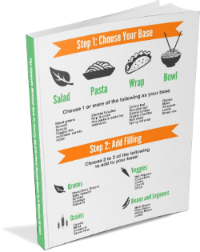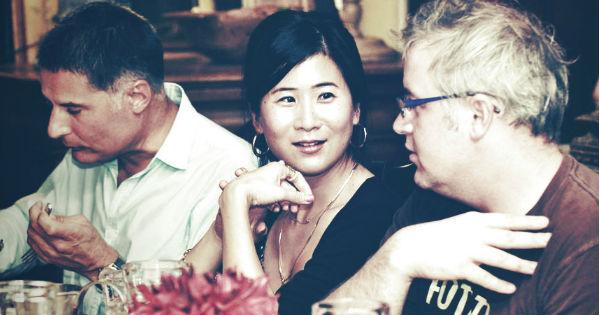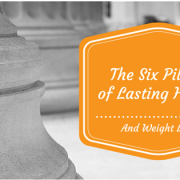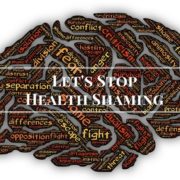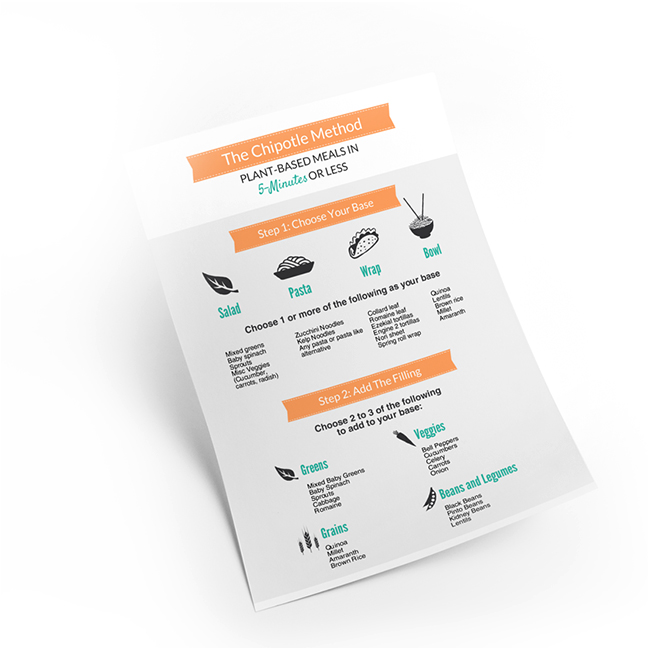
Photo Credit: Didriks
I didn’t expect this to be such a big deal before I made the decision to make my health a priority.
But it ended up being one of the most continually frustrating and difficult challenges that I faced.
To what am I referring, you ask? Why don’t you just spit it out, you say?
The number one struggle was, is, and will be how to deal with the social dimension of adopting a healthy lifestyle.
Family, friends, holidays, travel, going out to eat.
I swear I could put together the absolute best comedy routine based on the weird, sad, enraging, frustrating interactions I’ve had with others in regard to my dietary choices.
Bringing my own little slice of “cake” to birthday parties? Oh yeah.
Getting made fun of for drinking “pond scum.” Yep.
Going over a menu with a server, finally finding a viable option, and then being served a deep fried eggplant dish? Been there!
And I’m certainly not alone. Check out this recent email from one of my readers.
“I travel a lot for my job and take clients out to eat all the time. Most of the time, I can handle the harassment of my dietary choices but there are times when traveling to places such as Omaha, NE or Tulsa, OK that have been challenging and not easy to mask my dietary “restrictions.” I have thick skin, but sometimes it is really hard to go to a restaurant that someone else chooses and find something I can eat other than a salad and potato. – Heidi W
Le sigh. I hear you, Heidi.
When I taught a class called Lifestyle Support at a center specializing in plant-based nutrition, discussing social issues was my favorite topic.
Why? Because we could all relate.
We laughed at all the awkward times we had ordered three side salads at a steakhouse and pulled an avocado out of our bag to complement our “meal.”
We nodded our heads when hearing others discuss the pain and challenge of having a significant other that isn’t on the same page.
We groaned at the embarrassment of trying to explain ourselves to extended family and being shot down, because we didn’t know how to artfully explain nutrient density or some other nutritional concept.
But learning how to navigate these social challenges is absolutely critical when we decide that our health must be given the attention that it deserves.
Why is it so important?
Because it is very often the deal breaker between those who are successful long-term and those that are not.
I was shocked when I found out the degree to which our social connections influence our health and well being.
In a study highlighted in the New York Times, the researchers found that when we have a close friend that becomes obese, we are 57% more likely to become obese ourselves.
Even more incredible is that we are 20% more likely to become obese if the friend of a friend becomes obese.
With data like this, it becomes absolutely imperative that we learn how to surf the treacherous waters of social engagement and avoid being pulled back into our old habits.
Of course, I highly recommend that you get out there and make some friends that are walking the same path. It makes all the difference.
More on creating a supportive social network in…THE FUTURE!
But today, I want to talk about something slightly different. I want to talk about…well…talking about becoming a vegan.
When we make the highly personal decision to eat a more plant-based diet, the impact of our choice extends well beyond ourselves.
Your significant other, your kids, your relatives, your close friends are all affected, and they will certainly have questions, an opinion, and likely a position as well.
How do you answer the questions about why you decided to make such a “radical” change?
What happens when they get concerned about the changes that you have made and want to know where you’ll get your protein?
What about those who are straight up obstinately opposed and are set on having a nutritional debate on the merits of fish oil?
How do we explain ourselves? How do we win friends and influence others while holding what is often a rather unpopular position?
The unfortunate truth is that this never becomes totally easy.
But it does get easier and easier, and what I want to share today is this amazing little insight that took me years to figure out.
We can improve how we dance with our social challenges.
I seem to have made an irrevocable pact with the universe that I was going to learn all my lessons the hard way.
So in true Matt fashion, it took me years and years and being hit over the head with a shovel three times to realize that I could change the way that I talked about my plant-based lifestyle.
I could experiment with describing what I was doing in different ways and see how people responded.
I didn’t necessarily have to give them the exact same spiel.
I didn’t have to defensively espouse the immense health, economic, environmental, and spiritual values of eating plants when asked a simple question like “Where are you from?”
I wasn’t getting the hoped for result when I would wrestle someone to the floor and force feed them romaine lettuce while screaming, “it’s not so bad! you kind of like it, right?”
Not Doing This Right Made Things Worse…For Everybody
The worst part is that I now realize that I did more harm than good.
It is my passionate belief that if everyone went plant-based, we could make a huge dent in our twin health and environmental crisis.
I’ve personally witnessed how effective this is at helping others lose weight, reduce or eliminate medications, sleep better, laugh more, step lighter, and prepare for a wonderful and quality second half of life.
And it’s just so utterly painful to see a loved one struggle with health issues when you know some concrete and simple steps that would at the very least improve their condition!
But my lack of sophistication in how I broached the subject ended up turning people off. Based on our interaction they were less inclined to consider eating more plants.
And because there are so many self-righteous evangelical vegans out there, it has become quite the polarizing label.
No wonder my facebook newsfeed is 50% vegan jokes and 50% cat videos.
So today I’m very happy to share with you 7 Essential Rules For Talking About Your Plant-Based Lifestyle
We can, we must do better — not only to help ourselves be happy and healthy on the plant powered path, but also to stop alienating all those out there who could benefit from more plants in their life.
And after talking with hundreds of people who were struggling with these social issues, I began to realize that there are some best practices.
There are strategies that we can employ that allow us to stay true to ourselves without putting everyone on the defensive.
As Dr. Doug Lisle puts it, we can get along without going along.
I’ve distilled what I’ve learned into the following tips. Try them out for yourself!
1. Try Experimentation Over Identification
When I first went plant-based, I considered it an experiment. It wasn’t my goal to be 100% plant-based forever.
I was going to give this lifestyle a test drive and see how I felt after a few weeks.
It wasn’t until a few months later that I realized there was no going back. To my surprise, I had become something I’d never imagined I would be — a vegan!
At this point, I began to identity with the vegan label, and as such I began speaking about my lifestyle differently.
Instead of saying, “Hi I’m Matt, and I’m experimenting with this new plant-based diet.” I would say, “Hi, I’m Matt and I’m a vegan.”
The difference in how others responded to these two introductions was remarkable.
When I was “experimenting” there was a sense of objectivity. I wasn’t as attached to the outcome, and was more able to step back and honestly assess the situation.
I could be truthful and upfront about all the good things about my lifestyle as well as the challenges.
When I became a vegan, any challenge became a threat to who I was. I became more interested in defending my position than honestly assessing it.
And on a very subtle level, I had by definition created an arch nemesis! Vegan vs omnivore.
Others sensed this and did the only reasonable thing, defended their own position.
This is why I personally choose not to call myself a vegan.
When you experiment, there is no identification, no opposition, and both sides are able to look at what’s happening with less emotional attachment to the outcome.
Billy Jean: Would you like to try some of this deep fried twinkie that I just prepared?
Me: Thank you so much for the offer, but I’m actually experimenting with eating non-processed food that is plant-based to see if I can bring down my blood pressure.
Billy Jean: How long have you been experimenting?
Me: Oh about five years (I usually get a laugh at this). You know it’s funny, I was reading about the benefits of eating this way, and thought I’d give it a try, thinking I’d maybe last three days. Turns out it wasn’t nearly as hard as I thought it’d be, and I started feeling amazing so I just kept going with it.
2. Tell Your Story
Many people on a plant-based diet have seen results, that go far beyond the subjective experience of “I feel great and my skin looks way better!”
If you’ve lost 113 pounds, have dropped your blood pressure from 159/85 to 129/80, your LDL cholesterol from 121 to 67, eliminated medications, or any of the other not-so-uncommon effects of a plant-based lifestyle don’t hold back!
Have you or a loved one improved or reversed heart disease, type 2 diabetes, or another life threatening condition? Share your story!
This one may be a tad obvious, but sometimes we feel that sharing our success casts a shadow on those that aren’t making progress.
Think about the person that inspired you. What if they kept their success to themselves?
Share your story. Tell others what has worked. Let them know how thrilled and proud you are of your progress. It’s hard to argue with those kind of objective benefits.
By the way, others are usually much more understanding if you’re dietary change is doctor mandated.
You can play up the fact that you didn’t want to make the change, but you had no other choice!
3. Be Vulnerable
Vulnerability is a potent ally, holding the power to awaken compassion and understanding in even the most stubborn opponent.
And though it can be extremely difficult to drop your pride and let your challenges be seen, it is an incredibly effective tool that can turn a detractor into a supporter in just one conversation.
The best way to utilize it? Tell the truth and ask for help.
When I started my plant-based journey I experienced a lot of failure. I fell off the wagon, I made a lot of lackluster (sometimes inedible) food. I spent a ton of time and money trying to make things work.
(P.S.) There are much easier ways to make this switch. I just have a special proclivity for doing things the hard way
And though the results were worth it, it was a challenging time. I was unsure of myself, I didn’t yet know enough about nutrition to back up my decisions. I pretty much became a health hermit.
And because I was so unsure and challenged, if anybody asked me how it was going I had a tendency to tell them how great I felt, while omitting the rest of the details.
Instead, when someone asks you how it’s going, especially someone who is not the most supportive, try using this little double whammy:
Share your successes and then elaborately describe something that you are challenged with.
“It’s amazing, I’ve lost 20 pounds so far and feel like I’m in my 30’s again! But I tell you what, eating out is really challenging.”
Followed with this little gem: “If you felt like this was really working and wanted to see it through, but were tired of struggling with eating out, what would you do? Any ideas or advice for if you were in my shoes?
By sharing your struggle and asking them for advice, you automatically put them on your team. You completely flip the situation. Suddenly they are your advisor, your trusted friend.
It challenges the ego, but it is so very effective at turning people from adversaries into allies. And allies are extremely important on this journey.
4. Avoid The Evangelical Urge
When you begin to see the results of your new way of living, you’ll want your loved ones to feel as good as you feel, you’ll want them to get healthy, you’ll want them to understand how surprisingly easy it is.
You will be tempted to become evangelical.
Don’t. You are not allowed under any circumstances to push this on somebody who doesn’t want to hear about it.
It just doesn’t work.
Pushing will make them determined to prove themselves right and you wrong, and this means they will never ever accept anything you say.
Over time, your way of life will speak for itself. Your energy, health, youth, vitality will make a stronger argument than you ever could.
And at some point your loved ones will ask you a question.
Maybe it’s “Hey, what are you eating today? That looks pretty good,” or “Do you have any ideas for a plant-based protein powder?”
At this point, very kindly, without any air of “I told you so” offer them just the information that they asked for, and not more.
Do not let the floodgates burst open with all your nutritional wisdom! The questions must come from them.
Give them one simple step. One thing they can watch or do to successfully incorporate into their lives.
Taking this non-judgmental approach is the only effective way to help your family and friends. It will work for some. Others will never be open.
You may even end up pleading with someone to try changing their diet when they are on the verge of a health crises, and they still won’t budge.
That’s ok, even if it’s heartbreaking. Even when they gain weight, and have heart attacks, or are diagnosed with diabetes.
Everybody has their path, their way, their time and we have to honor that.
5. Accept Where They Are (Don’t Judge!)
As a follow up to the point above, eventually those around you will notice your glow and become interested in what you’ve been doing.
When someone asks you for advice, how you respond is an artful skill and will likely require some trial and error to get just right.
You have to judge their degree of openness. Understand what they are ready for, and give them the appropriate nudge to move them forward just one step.
It’s tempting to jump into, “yeah it’s so easy, so just stop eating all the things you love and start eating veggies and don’t forget to skip the oil and actually sugar isn’t that great for you either so you should avoid dates even though they aren’t so bad in the beginning especially as you are transitioning, but a lot of people go for faux meats but you have to check the labels…”
The eyes glaze over and you’ve already lost.
Few people are ready to jump in whole hog. If they are, they’ll likely tell you. Most just want to test the waters.
It doesn’t have to be all or nothing. Be gentle. Be understanding.
We sometimes want to chide others for just beginning with meatless monday rather than jumping into the lifestyle full throttle, for not buying all organic veggies or shopping at a big box rather than the local coop.
It’s understandable. We want them to get all the benefit.
But it’s more effective if you really see the person standing in front of you and engineer a win for them.
Give them one piece of information to digest. One simple thing that they can add to their diet to begin to see results.
When they win, they’ll come back to you for more.
6. Really Listen
Every person is unique. We all have our own path, our own challenges, our own struggles.
When someone talks to you about their health challenges and asks for advice, it can be such a simple straightforward solution for you.
“Ok remember how last time I told you to eat plants? Just freakin eat the plants!!!!! Ok? It’s not that hard. Just. Eat. The. Plants.”
But below the question you’ve been asked is a whole unseen world. To truly understand the particular context and nuance that hides in the question being presented to you, you have to dig deep and really listen.
In one my favorite books Switch: How To Change Things When Change Is Hard, the authors offer three incredibly interesting insights:
- What looks like resistance is often a lack of clarity.
- What looks like laziness is often exhaustion.
- What looks like a people problem is often a situation problem.
What is really holding this person back? Do they not know what to eat? Are they too tired to cook? Are they surrounded by unsupportive people?
If you honestly listen and dig deep you’ll arrive at the real issue.
And when people are heard, when they feel understood, and when they trust that you get what’s going on and will put their best interest first the stage is set for real change.
Trust is the catalyst for miracle transformations.
7. Learn What You Can, Admit What You Don’t
When you go plant-based you become a pioneer. You become a de facto spokesperson and exemplary for an important movement with much potential to inspire others to take charge of their health.
As such you have a responsibility to do your best to educate so that you can help others along.
You don’t have to know everything, but it will make your life so much easier if you learn — and practice — ways to answer the most typical questions that you are asked.
What is more likely to interest rather than alienate someone who asks you where you get your protein?
Option A: “I get more than enough protein from the plants that I eat. Did you know that getting your protein from animals causes cancer?”
Option B: “It’s an important question. Though there are different ideas on how much protein a person needs it generally falls somewhere between 30 – 70 grams of protein per day.
It is very possible to get that much protein from plant sources such as beans and legumes, nuts and seeds, or greens and veggies, though it sometimes takes some care and in certain cases supplementation to make sure individual needs are being met.
Plus with plant protein you avoid the principle of bioaccumulation, which is the process by which animals concentrate environmental toxins by up to 10 times. This is why the problem of mercury in fish is becoming more of a concern.”
It takes more work to prepare an answer like option b, but it is so much more effective.
Download Your Free Infographic
In order to give you an idea of how to apply these ideas in the real world, I put together an infographic of a sample conversation.
There is no set formula, and you never know how a conversation is going go.
But understanding that there are ways of talking about your lifestyle that are more effective than others at least opens to the door to improvement.
Like anything else this is a skill that requires practice. Just keep at it, keep experimenting, keep practicing, and your ability to navigate, engage, and inspire will become more refined.
Your challenge for the week: Take one of the ideas above and incorporate it into a conversation you have with another person about your plant-based lifestyle.
Afterwords, review how it went. What worked? What didn’t? How can you change things to make it more effective next time? Share the results in the comments below! I read every single one.
Click here to download a pdf version of the infographic.

We will never sell your information or spam you, ever.
Matt Jager is a wellness activist, yogi and co-founder of True Wellth. His life mission is to transform the healthcare and food system in this country, so that every single person has access to the tools and support they need to look and feel their best, control their health, own their happiness and revolutionize their well-being.
 Feel like you live in the kitchen? Get our FREE Chipotle Method PDF, Recipe Sampler, and Email Course and learn how to make quick, easy meals that are delicious and satisfying.
Feel like you live in the kitchen? Get our FREE Chipotle Method PDF, Recipe Sampler, and Email Course and learn how to make quick, easy meals that are delicious and satisfying.
